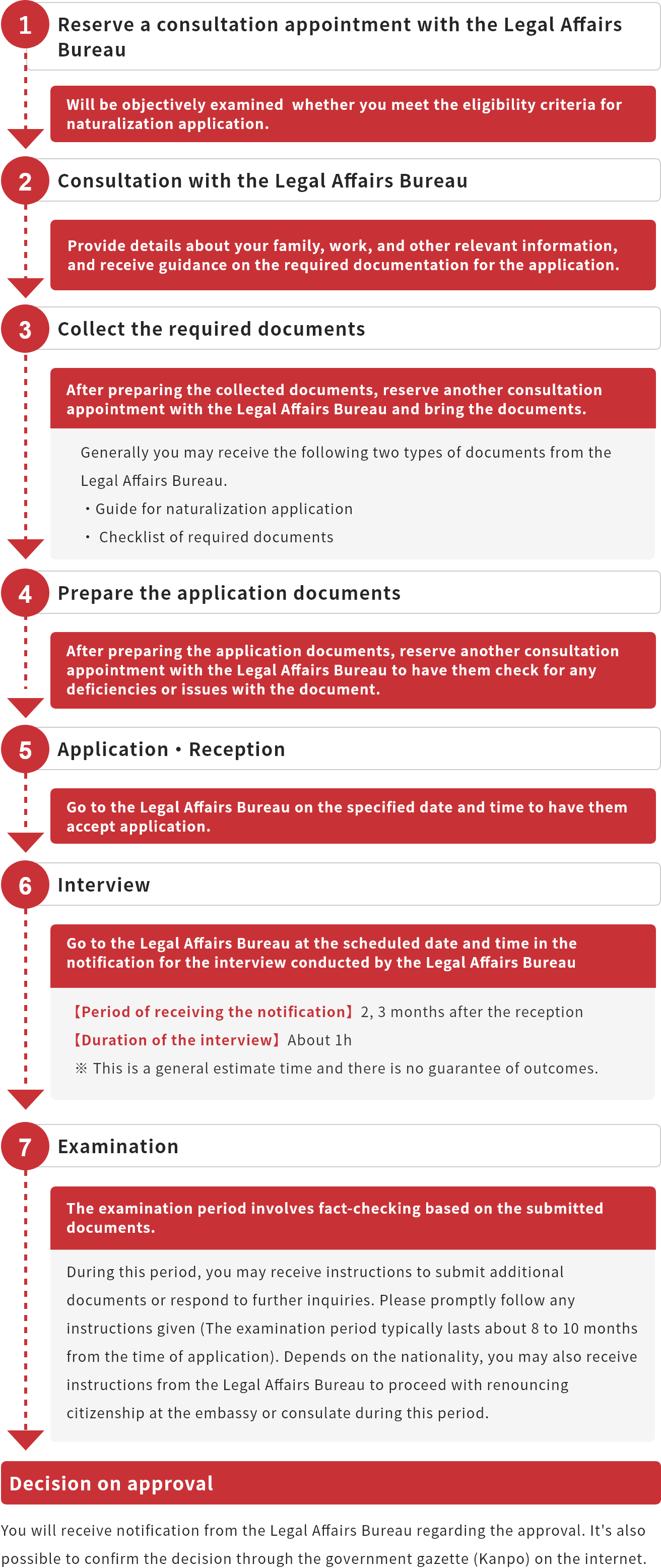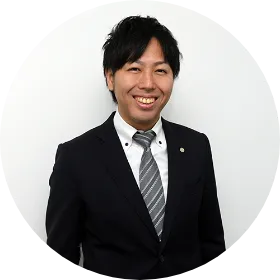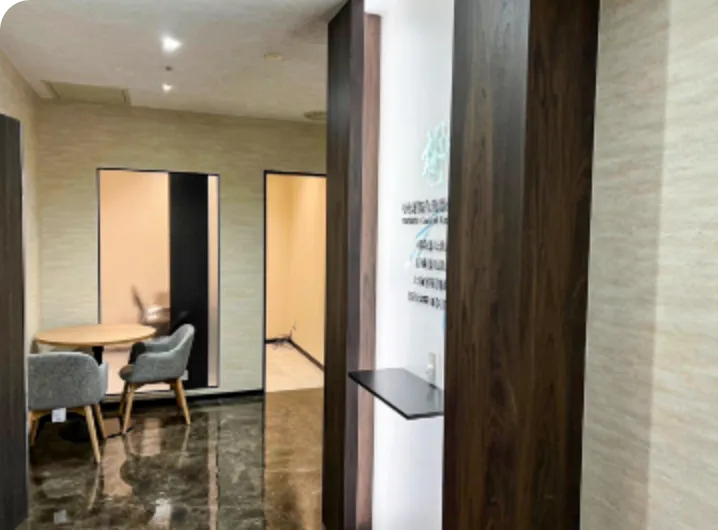What is naturalization application? Application flow, required documents for application, requirements for naturalization application, precautions for application, etc.
To customers who
☑ Want to have a stable life in Japan
☑ Don’t want to be subject to restrictions on period of stay or activities.
☑ Want to be Japanese
☑ Want to live in peace without the risk of being deported
☑ Want to obtain Japanese election right, security, etc.
What is naturalization?
If foreign nationals apply for naturalization and get approved, they will be given Japanese nationality and can live in Japan with the same rights as Japanese nationals.
Simply put, “naturalization” is a system in which foreign nationals who express their desire to acquire Japanese nationality are granted Japanese nationality with the permission of the Minister of Justice.
There are three ways to acquire Japanese nationality: “birth” “notification (of acquiring nationality)” and “naturalization”.
Of these, “naturalization” is stipulated in Articles 4 to 9 of the Nationality Act, and ” notification (of acquiring nationality),” which is easily confused with “naturalization,” is stipulated in Articles 3 and 17 of the Nationality Act. The difference between “naturalization” and “notification (of acquiring nationality)” will be explained in detail below.
| Overview of naturalization application | |
|---|---|
| Activities | Have Japanese nationality and can live with the same rights as Japanese people. |
| Period of stay | no limit |
| Standard ministerial ordinance | Although there are guidelines for the Minister of Justice to examine whether or not to permit naturalization, the final decision is left to the discretion of the Minister of Justice. |
Difference between naturalization application and nationality acquisition notification
As mentioned above, “naturalization” is stipulated in Articles 4 to 9 of the Nationality Act, and in response to a declaration of intention from a foreigner who wishes to acquire Japanese nationality, “naturalization” is a system that grants Japanese nationality with permission from the Minister of Justice. On the other hand, “nationality acquisition notification” is stipulated in Articles 3 and 17 of the Nationality Act, and a person who meets certain conditions listed below can acquire Japanese nationality by notifying the Minister of Justice.
Nationality acquisition notification pattern ①
Acquisition of nationality through recognition (Article 3 of the Nationality Act)
In principle, a child born before the marriage of a Japanese father and a foreign mother will not acquire Japanese nationality by birth, unless the father recognizes the child as a fetus. If the father recognizes the child and the following requirements are met, the child can acquire Japanese nationality by notifying the Minister of Justice.
- Under 18 years of age at the time of notification.
- The father who gave the recognition must be a Japanese citizen at the time of the child’s birth.
- The father who recognized the child must be a Japanese citizen at the time of notification (if the father who recognized the child is deceased, he has to be a Japanese citizen at the time of his death).
- Must not be a Japanese citizen.
Nationality acquisition notification pattern ②
Reacquisition of nationality for those who have not reserved their nationality (Article 17, Paragraph 1 of the Nationality Act)
A child born in a foreign country who acquires Japanese nationality and foreign nationality at the same time at birth will lose Japanese nationality retroactively to the time of birth unless a notification of reservation of Japanese nationality is submitted along with the birth registration. However, children who have lost their Japanese nationality due to not retaining their Japanese nationality may reacquire Japanese nationality by notifying the Minister of Justice if they meet the following requirements.
- Under 18 years of age at the time of notification.
- Having an address in Japan (“Having an address in Japan” means that the person’s base of life is in Japan at the time of notification, if the person is temporarily staying in Japan for sightseeing, visiting relatives, etc, it will not be recognized as having an address in Japan).
Nationality acquisition notification pattern ③
Reacquisition of nationality for those who have not selected nationality after receiving a demand (Article 17, Paragraph 2 of the Nationality Act)
Persons with dual nationality who have Japanese nationality and foreign nationality must change their nationality by the time they reach 20 years of age if they became a dual nationality person before the age of 18, and within two years if they became a dual nationality person after reaching the age of 18. (Article 14, Paragraph 1 of the Nationality Act).
If you do not choose your nationality within this period, the Minister of Justice may request you to choose your nationality in writing. At this time, if the whereabouts of the other party are unknown or there are unavoidable circumstances, it can be published in the official gazette, and the day after it is published, this notice is deemed to have reached the other party (Article 15 of the Nationality Act). 1 and 2).
After that, if a person who receives a notification in the official gazette does not choose Japanese nationality within one month, he or she will lose Japanese nationality at the end of the period. If you meet the requirements, you can reacquire Japanese nationality by notifying the Minister of Justice.
- The notification must be in the official gazette.
- Statelessness at the time of notification of acquisition of nationality or loss of foreign nationality at the time of acquisition of Japanese nationality by notification.
- The notification for reacquisition must be submitted within one year from the day you learn that you have lost your Japanese nationality.
If a foreigner who does not meet the above three conditions for notification of acquisition of nationality wishes to acquire Japanese nationality, he or she will need to apply for naturalization.
Difference between naturalization and permanent residence
As mentioned above, “naturalization” is stipulated in Articles 4 to 9 of the Nationality Act, and in response to a declaration of intention from a foreigner who wishes to acquire Japanese nationality, “naturalization” is a system that grants Japanese nationality with permission from the Minister of Justice. On the other hand, “permanent residence” means that a foreigner retains his or her foreign nationality and continuously lives in Japan with a permanent resident visa which is one of the residence statues.
Japan does not allow dual nationality, so once you naturalize and acquire Japanese nationality, you will need to leave your original foreign nationality. If that happens, you will be treated as a foreigner in your home country.
Depending on the country, you may not be able to work, participate in politics, or receive social security in your home country. Also, once you leave your nationality, it will be difficult to return to your home country’s citizenship. Therefore, if you have a desire to return to your home country someday, or if you frequently return home for work or home visits, it may be better to become a permanent resident rather than apply for naturalization.
On the other hand, naturalization means leaving your original foreign nationality and acquiring Japanese nationality, so your family register will be newly established in Japan. If your spouse and children are Japanese (or have acquired Japanese nationality), the entire family will be registered in the same family register.
Additionally, you will no longer need to renew your residence status, and you will only need to go to your local government office for procedures such as marriage, divorce, and enrollment procedures for your child. You will live in Japan with having the right as same as Japanese. It will be possible to become a national civil servant, and there are other benefits such as the right to vote, social security benefits, and advantages in finding a job or getting a loan. If a child is born after naturalizing and acquiring Japanese nationality, the child will be able to acquire Japanese nationality and live in Japan without having to apply for a special visa or naturalization.
When going abroad, you can also obtain a “Japanese passport” which is said to have the highest credibility in the world. A Japanese passport allows you to travel to many countries without a visa, making it easier to go abroad.
As we have seen here, naturalization and permanent residence have advantages and disadvantages depending on each individual’s life and situation. You need to think carefully about your future life and situation, whether you want to live in Japan with Japanese nationality and consider which option suits your current and future life and situation.
Application for naturalization application
We will provide an easy-to-understand explanation of the application process, required documents, average processing period, etc. when applying for naturalization.
Application flow
Now, let’s take a look at the specific process of applying for naturalization.


What we have provided here is a general process and guideline, but when applying for naturalization, you will have to go around to the Legal Affairs Bureau many times and collect documents. Another major feature is that interviews are conducted by the Legal Affairs Bureau. First of all, be sure to understand the general flow and content so that you don’t have to worry about unnecessary effort, time, or worry.
Documents required for the procedure
We will guide you through the basic required documents for naturalization application. The required documents listed below are basic, and additional documents may be required depending on the applicant’s circumstances.
Obtaining the appropriate documents tailored to the applicant’s situation usually requires specialized knowledge and experience. It is more reassuring to seek advice from professionals rather than invest significant effort and time only to receive undesired results. (Please feel free to make use of our office’s ” Free consultation ” service.)
| ① Application for naturalization permission (attach photo (4cm x 3cm)) |
| ② Documents containing a summary of relatives |
| ③ Statement of Motivation for Naturalization |
| ④ Resume |
| ⑤ A document containing a summary of your livelihood |
| ⑥ Documents describing the outline of the business |
| ⑦ Copy of Certificate of residence |
| ⑧ Documents proving nationality |
| ⑨ Documents proving kinship |
| ⑩ Documents proving tax payment |
| ⑪ Documents proving income |
| ⑫ Documents proving residence history |
A certain amount of knowledge is required to prepare documents for naturalization application. In particular, the main application documents, ③Statement of Motivation for Naturalization and ④Resume must be clearly and accurately prepared. In addition, the documents and required range of documents to prove family relationships vary greatly depending on the country.
Particularly in countries with a family register system, the family register contains many legal terms, so even if you are good at Japanese, unless you are familiar with the law, translating and collecting information can be difficult.
Furthermore, an application for naturalization is not guaranteed to be approved just because the application has been submitted; instead, the application will be comprehensively examined to ensure that it does not go against Japan’s national interests and that it is possible to live properly in Japanese society.
A naturalization application is a procedure for changing nationality, and as it affects not only the applicant but also his or her family, the examination is carried out very carefully.
In addition, in some cases, the applicant is required to have a clear motive for acquiring Japanese nationality to be granted permission. ③Statement of Motivation for Naturalization ④Resume It is necessary to create an appropriate statement that will convey to the examiner why the applicant wants to be of service to Japan and why he or she desires Japanese nationality.
Therefore, when preparing documents, we recommend receiving support from experts such as administrative scriveners and lawyers who have specialized knowledge of immigration laws and other matters.
Average processing period
The standard period for a naturalization application to be approved is on average 10 months to 1 year. This is just a standard, and the period will vary depending on the applicant’s application details and circumstances, as well as the congestion of the application reception at the Legal Affairs Bureau.
Key points for naturalization application
We will explain in an easy-to-understand manner the important points to be aware of and frequently asked questions when applying for naturalization.
Conditions for naturalization application
For naturalization applications, since this is a procedure to change nationality that affects not only the applicant but also his or her family, there are strict conditions. Due to these characteristics, even if you meet all the conditions below, it does not guarantee that you will be granted permission, but we will introduce you to some major conditions.
① Residency conditions
At the time of applying for naturalization, you must have continuously resided in Japan for 5 years or more. Of course, illegal residence will not be recognized; you must be legally residing in Japan. As the requirement states “continuously”, continuity of residence is required. For example, if you have lived in Japan for two years in the past, returned to Japan, and then come back to Japan for a total of three years, you do not meet the conditions for applying for naturalization.
② Capacity conditions
As a general rule, applicants must be at least 18 years old and must have reached the legal age of majority under the laws of their home country.
③ Behavioral conditions
Of course, the applicant must be of good conduct. Good behavior means not committing crimes, fulfilling tax obligations, etc.
④ Livelihood conditions
You need to prove that you can live in Japan without having to live in poverty or depend on others. Living conditions are determined on a household-by-household basis, so even if the applicant has no income, there may be no problem as long as the spouse has income and assets.
⑤ Conditions to prevent dual nationality
Japanese law states that after becoming naturalized and acquiring Japanese nationality, you must renounce your home country’s nationality. This means that multiple nationalities are not allowed. However, in some exceptional cases, multiple nationality may be recognized.
⑥ Conditions for compliance with the Constitution
It will be judged whether you are willing to sincerely abide by the Constitution of Japan, which is the highest law in Japan. Naturalization will not be granted to persons who plan or advocate the destruction of the Japanese government through violent acts, or who are likely to establish such an organization.
The above conditions could be relaxed if the applicant has a strong relationship with Japan, such as being born in Japan, having a Japanese spouse or child, or having previously held Japanese nationality.
Therefore, if you have a close relationship with Japan, it is important to clearly state this in the required documents such as ③Statement of Motivation for Naturalization.
Points to note when applying for naturalization
I would like to explain two points that you should be especially careful about when applying for naturalization.
① Public payment examination
When applying for naturalization, to determine your residence status in Japan, you will be required to submit documents proving your payment of public pension insurance premiums, etc.
Foreign nationals aged 20 to 60 who live in Japan must enroll in the Japanese pension system. However, if you do not understand the meaning of a pension, such as those who came to Japan from a country without a pension system, there is a tendency to default on pension payments.
When applying for naturalization, it will be examined that you are living a decent life in Japanese society in accordance with Japanese law, so if you are considering naturalization, please be especially careful about public payment delays.
② Interview
In order to determine whether the person will not bring disadvantages to Japan, naturalization applications are subject to a detailed examination through an interview. During the interview, we will investigate your current living situation, marital relationship, whether you receive remittance from your home country, and your employment or part-time job status.
To avoid causing any misunderstandings to the interviewer and to ensure that the interview is properly evaluated, we recommend that you have enough practice for the interview on the instructions from experts such as administrative scriveners and lawyers with specialized knowledge before attending the interview.
Frequently asked questions regarding naturalization application
What level of Japanese language ability is required for naturalization application?
What are the questions often asked during naturalization application interviews?
①Confirmation of the details of the application
As part of the interview for the naturalization application, the official in charge will ask you questions about the contents of the application form you submitted at the time of the naturalization application. The questions asked will vary depending on the circumstances of each naturalization applicant, such as the circumstances when they arrived in Japan, and the circumstances of the marriage if they were married in Japan.
②Livelihood situation
Although the situation differs depending on the naturalization applicant, the naturalization applicant’s livelihood situation will be strictly examined and detailed questions regarding it will be asked during the naturalization interview. One of the reasons for this is to avoid a situation where, after your naturalization application has been approved and you have obtained Japanese nationality, your living situation is difficult and you are unable to live in Japan without receiving protection from the government. In addition, your fulfillment of your tax obligations, including whether you are paying taxes properly, will be strictly examined, so you need to be careful about your intention to pay taxes.
③Confirmation of Japanese understanding
After being granted naturalization and acquiring Japanese nationality, being able to read, write, and speak Japanese becomes essential in order to live as a Japanese. During the interview conducted by the official in charge, the Japanese language ability of the naturalization applicant is also strictly examined.
Can you have an expert appear in your place for the naturalization application interview?
After applying for naturalization, the naturalization applicant must receive an interview by the official in charge by himself/herself. In other words, even if a professional administrative scrivener or judicial scrivener handles all the naturalization application procedures on your behalf, you must receive the interview after applying for naturalization by yourself, attendance or representation at the interview is not allowed.
For this reason, our office not only prepares documents for naturalization applications but also takes sufficient time to prepare for the interview after the naturalization application reception by implementing preparation and simulation.
Can I apply for naturalization if I am unemployed or a housewife?
Can I freely choose my name after naturalization is granted?
In the past, there was an instruction to change the name following Japanese custom, however, many of the Chinese clients of our office remain in their previous name recently.
we were instructed to change our names to suit Japanese names, but there are many cases where Chinese nationals who come to our office use their old names.
How long does the screening take?
Do I need to extend my current visa while applying for naturalization?
Is it possible to travel abroad or go on a business trip while applying?
My parents don’t want to naturalize, can I apply for naturalization by myself?
Can I naturalize even if I am a minor?
In principle, to naturalize, you must be at least 18 years old and have reached the age of majority under the laws of your home country (meeting the capacity requirements), but in the following cases, even if you are a minor, you can still apply for naturalization.
① If you apply for naturalization together with your parents
② If one of the parents is Japanese nationality
③③ If the child of a foreigner married to a Japanese person is adopted by that Japanese person and continues to reside in Japan for more than one year, or if a Japanese couple adopts a child from overseas and continues to reside in Japan for more than one year
In the case of ②, in addition to the “capacity requirements (underage)”, the “residency requirements” and “livelihood requirements” will be relaxed, and you can apply for naturalization regardless of your age, period of living in Japan, or income. However, please note that even if a family member applies for naturalization, the examination will be done individually, so there is no guarantee that the naturalization application will be approved or not granted for all family members. For example, parents who are fluent in Japanese are allowed to naturalize, but their child is rejected due to being unable to read or write Japanese at all.
In addition, in terms of procedures, in the case of a person under the age of 15, the parent, who is the legal representative will carry out the naturalization application procedure. If you are between the ages of 15 and under 20, the minor will be responsible for completing the naturalization application procedures such as preparing minor documents and interviewing.
Generally, all members of the household are involved in the examination of naturalization applications, so rather than family members applying for naturalization separately, it is recommended to apply for with the whole family at the same time unless there is a particular problem for cutting down the cost.
Can I naturalize as a student?
・For minor students
As mentioned above, if you are a minor student, you can apply for naturalization with your parents, or if you meet the conditions of being a natural child or adopted child of a Japanese citizen.
Minors do not need to meet their livelihood requirements, but they must be able to prove that their parents who live with them have sufficient income and are supported by their parents.
・For students who are 18 years of age or older and have reached the age of majority in their home country
If you are a student who is 18 years of age or older and has reached the age of majority in your home country, you may be able to apply for naturalization as an individual because you meet the “capacity requirements” for naturalization.
However, in the case of students, even if they have sufficient income from part-time jobs or side jobs, there are few cases where they can be considered to have a stable income overall from their employment situation. In this case, it may be difficult to apply for naturalization alone because the livelihood requirements are not met.
On the other hand, if you are dependent on your parents for your living, you will need to be supported by your parents who live with you and have sufficient income, just like minor students.
If your parent’s income is low or you have no family ties to Japanese people, we recommend that you obtain a work visa before applying.
Can I naturalize if I have debts or have filed for bankruptcy?
Can I apply for naturalization even if I have a criminal record?
In the case of minor traffic violations, there are many cases in which permission is granted by showing remorse without concealing the violation.
In addition, there are cases in which permission has been granted if approximately five years have passed since the execution of the sentence was completed or after the sentence was no longer served.
I am currently making a living through part-time work. Will my application for naturalization be granted?
When applying for naturalization, it is not required to be a full-time employee of a company.
However, as a requirement for naturalization, there is a livelihood requirement, in other words, it is necessary to be able to live as a Japanese without being dependent on the government (welfare assistance, etc.). Currently, the stability of the naturalization applicant’s income and expenditure and how many years have passed since he or she first started working are also important points in the examination. If your income and expenses are balanced and your lifestyle is stable, your naturalization application may be approved even if you are a part-time worker, but we can’t deny that applying for naturalization will be a little difficult compared to full-time employees, temporary employees, contract employees, etc.
Even if it is a part-time job, if you are self-employed and have a stable income by holding multiple part-time jobs, there is a good chance that you will be granted naturalization.
During your naturalization interview, you will be asked detailed questions about your livelihood, so you will need to prepare well.
I am currently residing on a student visa, but can I naturalize?
I have a driver’s license. What will happen if I am granted naturalization and acquire Japanese nationality?
Naturalization application Support and Fees
Support and fees for naturalization application are as follows.
Our office’s naturalization support details
Creation of naturalization application form
Created based on the legal affairs bureau format.
Drafting a Statement of Motivation
We will create a Statement of Motivation for those who don’t know what to write, or who have something they want to write but can’t organize well.
*Special permanent residents do not need to submit a statement of letter.
Adjustment of required documents
We will provide you with a list of required documents. (*After application)
If you make a request, you will no longer need to visit the Legal Affairs Bureau multiple times for consultation. Basically, we will proceed with preparations so that applications can be accepted at once. (*In the Tokai and Kansai regions, many legal affairs bureaus require prior consultation, so you may be asked to go to the legal affairs bureau before the reception of the application.)
Obtaining a certificate on your behalf
For certificates obtained from the following organizations, we will obtain them with a power of attorney on your behalf.
・City/ward/town/village offices in Japan
・Ministry of Justice ・Tax Office
・Prefectural tax office
・Driver’s License Center
・Korean Consulate *For Korean nationals
*Excludes items that can only be obtained by the person in question.
You will be responsible for the cost (actual cost) of obtaining certificates, etc.
Translation (limited to Chinese, English, Vietnamese, and Nepali)
Our company has Chinese, English, Vietnamese, and Nepali translation staff.
*You will be charged for the translation fee (1,000 yen/1 A4 size page).
*For a handwritten family register in Taiwan or a handwritten certificate in the Philippines, we may quote 2,000 to 3,000 yen/A4 size in advance.
Document inspection (check)
*In the Tokai and Kansai regions, our staff will go to the Legal Affairs Bureau to get the documents checked in advance. If you have any concerns or questions during the document preparation process, please contact us. The person in charge will contact you by phone or email at any time.
Finally, we will review all the documents we have received from an overall perspective and prepare them for application.
Interview preparation simulation
After your application is accepted, we will thoroughly simulate your interview with you at our office so that you can respond appropriately during the interview.
After-sales follow-up
If there is a change in the applicant’s personal circumstances (relocation, job change, marriage, childbirth, departure from Japan, etc.) during the period from the application being accepted until the results come out, we will provide support and advice on preparing and obtaining additional documents.
You will not be alone even after the application is accepted, so if you have any concerns, please contact our staff in charge.
Procedures for renunciation and loss of nationality
We also support procedures for renunciation and loss of nationality after naturalization (before permission in China and Taiwan).
| Support content | Application document check plan (Consumption tax included) |
Application document preparation plan (Consumption tax included) |
Reliable full support plan (Consumption tax included) |
|---|---|---|---|
| Free consultation (first time only) | 0 yen | 0 yen | 0 yen |
| Naturalization application support | From 110,000 yen | From 133,000 yen | From 155,000 yen |
In naturalization applications, the applicant will be responsible for determining and managing “what materials are needed” and “what materials are not needed” as necessary materials, and managing schedules and preparations such as “what materials must be prepared by when”. It could be challenging to do many things without specialized knowledge or experience.
Also, even if you spend a lot of time and effort on something difficult like this, there are many cases where you are not able to get the results you want.
At our office, we support these types of visa applications in a kind, courteous, and speedy manner while carefully listening to the applicant’s situation, providing support with the peace of mind and satisfaction that only professionals can provide.
To better resolve applicants’ problems, as necessary, our legal group provides one-stop legal services in collaboration with administrative scriveners, lawyers, judicial scriveners, and other professionals.
We also have foreign staff who can speak English, Chinese, Korean, Vietnamese, and Nepali.
Please feel free to contact our office for a consultation. For consultations, please use the “Free Consultation” service, where you can consult with a specialist free of charge (for the first time only) from here.
Editor of this article

- Ryota Yanagimoto
- Administrative Scrivener/Judicial Scrivener
At the age of 24, he passed the national examinations for judicial scrivener, administrative scrivener, and wage service manager at the same time.
While working as a full-time lecturer at a major prep school, he independently opened a legal office related to judicial scriveners and administrative scriveners,
and he has experience as a judicial scrivener and an administrative scrivener for more than 15 years so far.
He has been actively contributing to various industries such as publicly listed companies, real estate companies, financial institutions, elderly care services, and professional organizations by conducting seminars, lectures, and talks.
And now he has a record of over 60 presentations so far.
Furthermore, as the president of a Japanese language school announced by the Ministry of Justice and Acts, and an advisor to a real estate company (capable of handling foreign clients),
he has been involved in various aspects of industries related to foreigners.








 0120-138-552
0120-138-552 Free
Consultation
Free
Consultation Contact Us
Contact Us